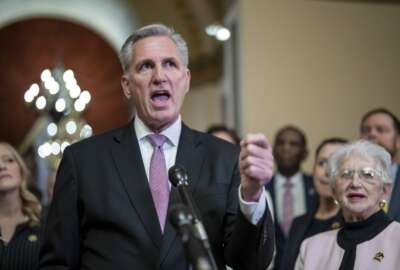VA warns 81K health care employees’ jobs at risk under House GOP debt ceiling plan
Federal agencies are warning that a deal by House Republicans to raise the debt ceiling in exchange for significant budget cuts would eliminate the jobs of tens...
Federal agencies are warning that a deal by House Republicans to raise the debt ceiling in exchange for significant budget cuts would eliminate the jobs of tens of thousands of federal employees.
The Department of Veterans Affairs announced Friday that a plan led by House Speaker Kevin McCarthy (R-Calif.) to cut nondefense federal spending would result in the loss of 81,000 jobs across the Veterans Health Administration.
The VA estimates such a major reduction of its health care workforce would mean 30 million fewer patient visits per year, and would limit veterans’ access to cancer screenings, mental health services and substance addiction treatment.
The Office of Management and Budget estimated Thursday that McCarthy’s proposal would result in a 22% cut to nondefense discretionary spending.
McCarthy’s bill, the Limit, Save, Grow Act, would bring fiscal 2024 discretionary spending back down to 2022 levels, but would exempt defense spending. The bill would limit federal spending to 1% growth a year for a decade. House Republican leadership released the bill on Wednesday.
The bill would raise the debt ceiling by $1.5 billion, or until the end of March 2024 — whichever happens first.
“This bill is vague by design — but that doesn’t obscure the fact that it will force devastating cuts that will hurt millions of people, damage our economy, and undermine our national security,” OMB Director Shalanda Young wrote in a blog post on Thursday.
The VA estimates it also would need to eliminate more than 6,000 staff at the Veterans Benefits Administration.
Those cuts would increase the disability claims backlog by an estimated 134,000 claims, “forcing veterans and their surviving loved ones to wait longer for the benefits they have earned.”
The VA would make these severe workforce cuts at a time when it’s ramping up hiring to handle a growing workload under the PACT Act, which is meant to expand VA care and benefits for veterans exposed to toxic burn pits during their military service.
The VA said budget cuts would also force the National Cemetery Administration (NCA) to eliminate approximately 500 staff, and would delay the opening of five new national cemeteries.
The VA stands out as the agency that would see the biggest potential loss of federal employees under the spending plan, but other agencies have also stated they would be forced to cut staff under the plan.
McCarthy, in a speech at the New York Stock on Monday, said the proposal would not result in “draconian limits,” and that lawmakers under the spending plan “make sure that our veterans and our service members are taken care of.”
“The bloated, overgrown bureaucracy that has expanded under President Biden needs to be pruned, and that’s exactly what we’ll do. If Washington wants to spend more, it will have to come together to find savings elsewhere — just like every household in America does,” McCarthy said.
The spending plan would also rescind unspent COVID-19 relief spending. It would also roll back all unspent IRS funds received in the Inflation Reduction Act to rebuild its workforce and upgrade its legacy IT systems.
The IRS, using about 1% of the nearly $80 billion received in the Inflation Reduction Act, went from answering 15% of calls in 2022 to answering 87% of calls this year.
“If we’re funded at a steady level or cut, then all we can do is maintain our current operations,” IRS Commissioner Danny Werfel said told the Senate Finance Committee on Wednesday.
“We have to make investments to deal with this complexity of what we see today.”
Julie Tippens, legislative director at the American Federation of Government Employees, wrote in a letter to lawmakers that federal deficits are “not the result of growth in federal agencies or employment,” adding federal civilian employment remains less than it was in the 1960s.
“Federal workers have continued to maintain public safety and provide public service throughout the pandemic, even as their wages have lagged behind inflation and continued to trail the private sector,” Tippens said.
AFGE said other agencies have informed the House Appropriations Committee that they would also force to make significant cuts to their workforce under the House Republicans’ spending plan.
The Social Security Administration said it would need to close field offices, reduce hours and increase wait times by up to 30%.
The Department of Homeland Security would have to reduce hours of service at sea and land ports of entry, and that those cuts would result in “likely increasing the amount of fentanyl entering the country.”
The Transportation Security Administration would also be forced to furlough frontline staff, resulting in airport wait times going up “in excess of two hours.” AFGE also warns the budget cuts would also roll back the agency’s recent efforts to improve TSA staffing, pay and retention.
The Agriculture Department warns it could see a $250 million cut to its Food Safety and Inspection Service, and that cuts to its workforce of inspectors could lead to delays and higher food production costs.
The Transportation Department warns that proposed cuts would force the Federal
Railroad Administration to announce a Reduction In Force, and layoff 175 personnel, including 75 safety inspectors.
White House Press Secretary Karine Jean-Pierre told reporters Thursday that President Joe Biden has not yet scheduled a meeting with McCarthy over debt ceiling negotiations.
The Treasury Department estimates the federal government would reach the current debt limit by early June.
If the debt limit is reached, Treasury is prepared to take several “extraordinary measures,” such as temporarily suspending new contributions in the Civil Service Retirement and Disability Fund, as well as the Postal Service Retiree Health Benefits Fund.
Treasury is also prepared to temporarily suspend contributions to the Thrift Saving Plan’s G Fund.
Copyright © 2024 Federal News Network. All rights reserved. This website is not intended for users located within the European Economic Area.
Jory Heckman is a reporter at Federal News Network covering U.S. Postal Service, IRS, big data and technology issues.
Follow @jheckmanWFED





